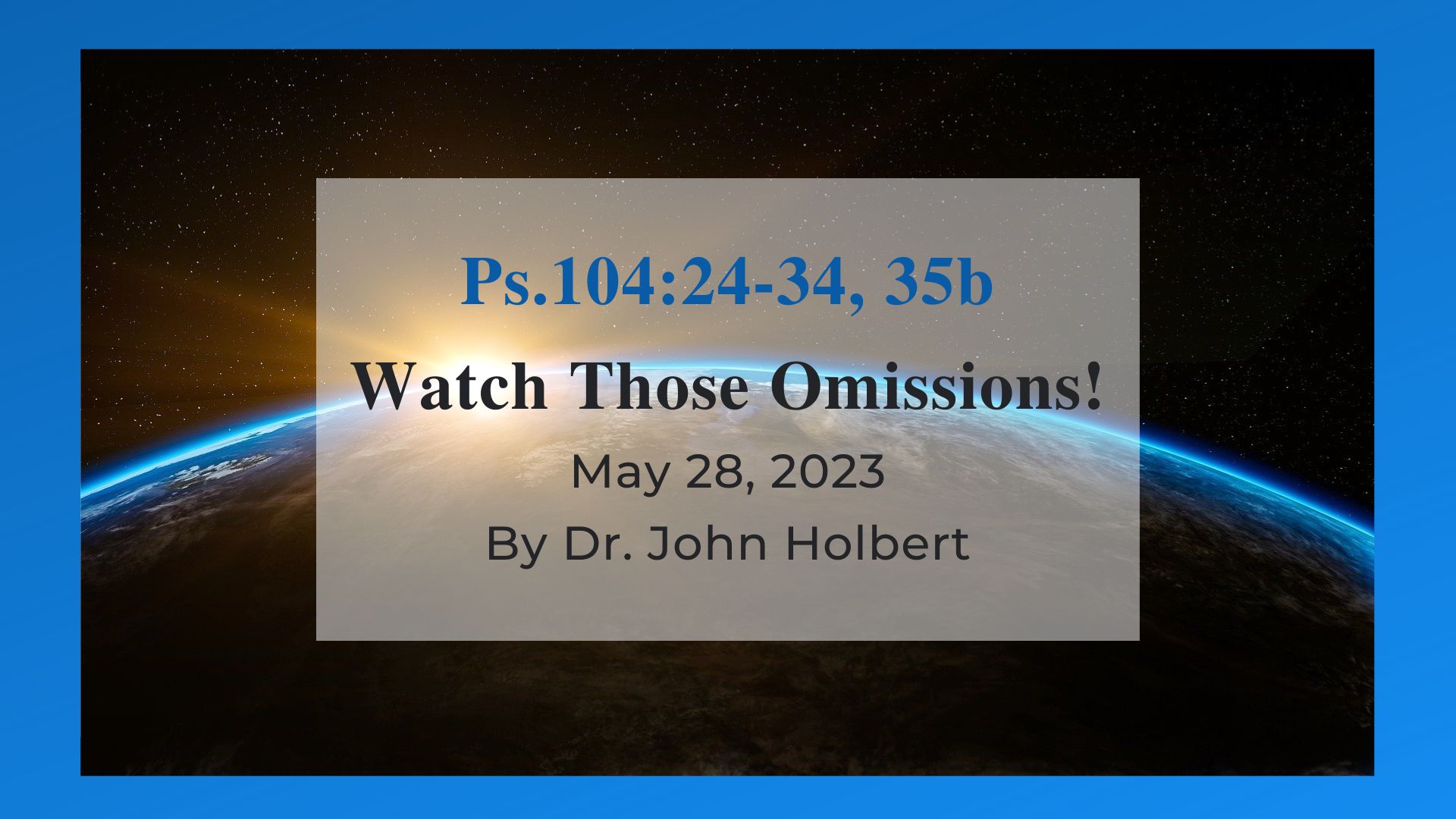Watch Those Omissions! - Reflections on Ps.104:24-34, 35b
by Dr. John Holbert on Monday, May 22, 2023

Watch Those Omissions!
Ps.104:24-34, 35b
The Peripatetic Hebrew Bible Preacher
I would imagine that most preachers will give primary attention on Pentecost, the so-called “birthday of the church,” to Acts 2, the tale on which the celebration is largely based. I have written about Acts 2 any number of times, often pointing out the horrifying anti-Judaism that pervades Peter’s sermon, and urging that modern preachers not follow the fisherman in his 1st-century attacks against his own religious traditions, based on exclusionary rhetoric. If we imagine that the Christian church was founded that day in Jerusalem, we should further hope that it was not founded on the slippery slope of being more against certain ideas than for the universal love and grace represented by the crucifixion and resurrection of Jesus of Nazareth. Any so-called church that identifies itself as a community that excludes anyone is certainly no community I choose to be a part of. Those Jews in attendance at Peter’s sermon that day could have felt nothing but full exclusion from what the apostle was saying; the fact that some thousands found conversion was nothing less than a miracle, but at the same time may have been an indication that those early converts bought into Peter’s exclusionary language. If so, I deeply desire that the modern church move beyond such exclusivism, though, as a United Methodist, I still see today just how many of my sibling denominational members find exclusion a central part of what they see as fundamental to their Methodist existence. The newly formed Global Methodist Church (GBC) has overtly announced its exclusion of LGBTQ+ persons from its leadership, and some from its general membership, thus to me presenting themselves as no Christian church at all.
It could be helpful for the members of the new GMC to read and ponder Ps.104 which offers, at least in part, a full portrait of a God of universal gift and power. Ps.104:24-34 is rife with announcements of God’s provision for the whole world. “How vast are your works, YHWH; all of them you have made with wisdom; the earth is filled with your creatures” (Ps.104:24)! The poet proclaims that everything in the earth is made by God. Thus, nothing that exists is beyond the creative hand of YHWH. As an old saw had it: “God don’t make junk,” and this verse says that, too, albeit in more traditional language. “These all (God’s created creatures) look to you to give them their food at the right season. When you give it to them, they gather it; when you open your hands they are filled with good things” (Ps.104:27-28). And, it should be noted, that among these divine creations, one finds even “sea monsters,” including the mighty Leviathan, the twisting serpent of the sea from the ancient Canaanite mythology (Ps.104:26). The fact that YHWH created Leviathan, a loathed and dangerous denizen of the mighty deeps, makes it plain that YHWH creates all things, even those things that some humans find appalling. Those who imagine that they can differentiate “good” creatures from “bad,” who imagine that they can announce who is “in” and who is “out,” have no full idea of just who the vast God is.
“May the glory of YHWH endure forever; may YHWH rejoice in these works” (Ps.104:31). It is not only we humans who praise and extoll the mighty acts of God; God also rejoices in the huge variety, complexity, and wonder of the creatures God has made. And the poem ends with the promise of the worshipper to praise this awesome God always: “I will sing to YHWH as long as I live (or perhaps “with my very life”); I will hymn my God always” (Ps.104:33). “I will bless YHWH with my very being; praise YHWH” (Ps.104:35b). A careful reader of the psalm should readily see that an ending line has been conspicuously omitted by the lectionary. Ps.104:35a reads: “May transgressors be obliterated from the earth; may the wicked no longer exist!” It is not uncommon for the collectors of the lectionary to omit such harsh verses from their readings, but I want to suggest that this omission is not in any way appropriate. Not only is the line important for the fuller meaning of the poem, but without the line, the poet loses a good portion of the poem’s power.
The poet says that this hope that “transgressors” and “the wicked” disappear from YHWH’s rich earth indicates that though God has made all things, the initial goodness of creation (see Gen.1) has been stained with human error and wickedness. God’s sovereign desire that all things exist in harmony, that all creatures find inclusive community, has been forever countered by those who cannot accept that all that God has created is good and welcome in the rule and reign of that God. Let me be clear about what this implies: any who deny the full inclusion of all that God has made are nothing short of transgressors and wicked purveyors of untruth. As a United Methodist, I can only conclude that the GMC is, in reality, no real church, but a collection of wicked transgressors who are defying the work and way of God. That may be harsh, but Ps.104 says with full clarity that the God who creates all things, the God who called the church into being at Pentecost, calls for that church to welcome all into its membership without restriction, without qualification. Just as Peter eventually learned with his vision of the cloth filled with animals in Acts 10, so must we all learn that “what God has made clean, no one may call unclean” (Acts 10:15).
